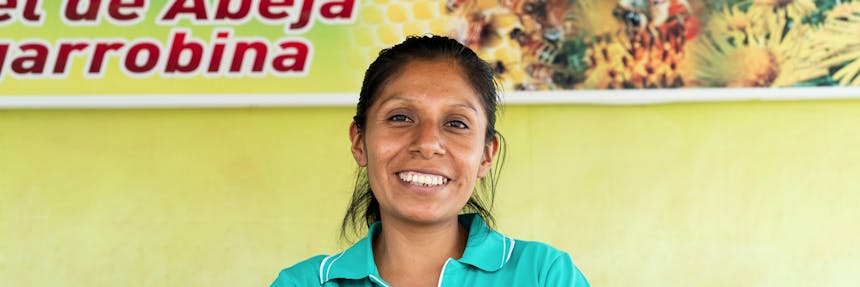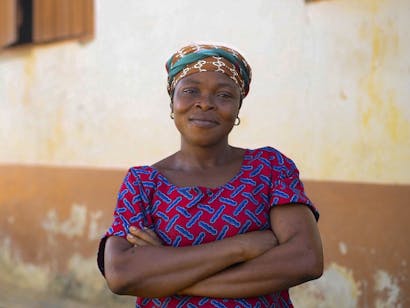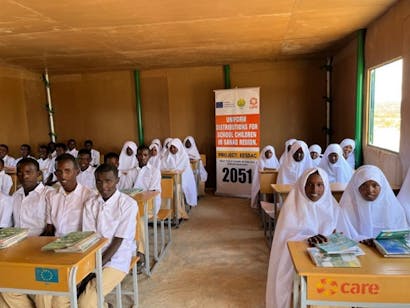María Julia is a beekeeper in Peru
35-year-old María Julia Ancajima Prado from Northwest Peru has come a long way since starting domestic work at the age of only 13.

“Before, I was too shy to advance my business, now I have overcome that shyness and I feel empowered and strengthened. Not even in my dreams did I think I would be the leader of an association and a national representative.”
Growing up, María Julia was the oldest child, with five younger siblings. She explains: “I didn’t enjoy my childhood much. I had to quit my studies when I was 12 to work and support my siblings. They were small and my dad did not have the financial resources for all of us to study.”
“At 13 I started working in a house in Piura. It was my first job and I was in charge of cleaning the house, washing and cooking. Happily, the owner treated me as if she were my mother and she taught me a lot. By the end I was a better cook than her!”
Starting a business
After several years as a domestic worker, María Juliawanted more independence and decided to start her own ironing business. The steam from the ironing caused her a few health issues so it was recommended that she eat honey to combat this. María Julia explains: “My family in Piura sent me honey. My husband has been a beekeeper since childhood so one day I said ‘Let’s work with bees.’” With the earnings of the ironing service María Julia started buying some hives.
Fast-forward several years and María Julia is now a successful beekeeper producing honey and preparing carob (similar to chocolate). She proudly adds: “Now I have several positions: I am President of the Adonai Association; I am on the Board of Farmers Markets of Piura; I am Treasurer and Board member of the National Association of Beekeepers in Lima; part of the Council of the National Beekeepers Confederation in Peru; and I represent the women beekeepers of Peru.”

There are fifteen women in her Adonai Association and formalizing the business was one of their biggest challenges: “When other people ask me for business advice, I always advise that first you must formalize. Once you are formalized, your customers put more trust in you and more doors will open. I have seen the results of the formalization in my own earnings. We have also made progress with registering trademarks and we achieved the food hygiene registration for our products.”
Developing her business skills
María Julia’s association received support from CARE, funded by H&M Foundation, through a wide range of training including: business planning; financial education; self-esteem; setting up a collective brand; marketing; e-commerce and more. She adds: “Developing my business skills are very important to me and I am now much better at managing my resources. As a result of the training we now have better packaging, our online sales have increased and my self-confidence has grown. Before, I was too shy to advance my business, now I have overcome that shyness and I feel empowered and strengthened. CARE taught us that we are worth a lot.”

Through CARE, María Julia’s association has also been able to access new markets, she adds: “The fairs we participated in have given our sales a boost and at those fairs we have built up a strong customer base. Our clients now recommend us to their family members, and so it goes in a chain.”
As the association progresses, the production is increasing. Many of the women who started out with one beehive have grown this to six or seven beehives and significantly more honey. María Juliaadds: “Our brand Sweet Retreat Tabanco is now well known nationally and internationally. Sweet for our honey; Retreat, because here you feel at home; and Tabanco for our town.” As President of the Association, María Julia comments: “I am always looking for opportunities for our members and I think it is of great benefit that we are nationalizing.”
Improvement in gender equality
María Julia’s family has been supportive of her business ventures from the outset. Speaking of her husband Pedro she adds: “My husband has realized how capable I am and he is very proud of me and supports me. I am proud to be an independent woman and I feel free to work and also to help others in my community.” She is also able to financially support her parents and her youngest brother.
María Julia has gradually seen a change in the sharing of domestic activities in her community. She explains: “Before, the ladies did not go to the fairs because they had to take care of their children. But when the husbands started coming to our meetings and heard about our experiences and sales, they have realized that we need their support. Now, the men are helping with childcare and with the preparation of carob, as they also want to learn. The attitude of men towards our business has changed over time for the better. We are now seeing an improvement in gender equality.”

María Julia has also noticed that women are beginning to have more influence in their communities and beyond. She has met with several Mayors to identify new business opportunities for women.
Collective savings
With the support of CARE, María Julia and her fellow association members have set up a communal bank where each member deposits a small amount (3-6 USD) each month. These collective savings are then lent out to members who need it, on a rotating basis. María Julia adds: “The communal bank has helped us a lot and our members have used it to invest in business materials. There is trust amongst us.” María Julia explains that in Peru, it can be difficult for a woman to take out a formal bank loan as a result of the husband’s poor credit rating. Luckily for María Julia, this has not been the case and she was recently able to get a bank loan to buy more land on which to nurture her bees and to buy transport to get to and from the hives. She adds: “I think banks should improve their interest rates on loans, they are often very high.” María Julia’s husband, who is now fully involved in her business, is now preparing the new land to plant alfalfa and to provide more pollen for the bees.
COVID-19 will make us stronger
Sadly, the COVID-19 pandemic is having a devastating impact on business. María Julia explains: “Since the start of the restrictions our sales have completely declined and we have no income. I have been able to pay for food with savings. I have some business loans, but repaying them now will be very difficult. But like every good entrepreneur I’m looking for ideas on how to get ahead.”
María Julia’s association is also finding a way to cope with the restrictions, she adds: “We set up a rota to take care of the beehives. We are also exploring setting up an online store with other beekeeper associations.”

Looking to the future, María Julia has expansion plans: “I would like to be a successful businesswoman. Not only nationally, but also internationally. I would like to export to other countries.” She confidently adds: “I know that my products are going to go very far.”
Her final advice to other women entrepreneurs around the world is: “You can get through this time of COVID19. It will teach us to be stronger. We need to fight for our children and ourselves.”


